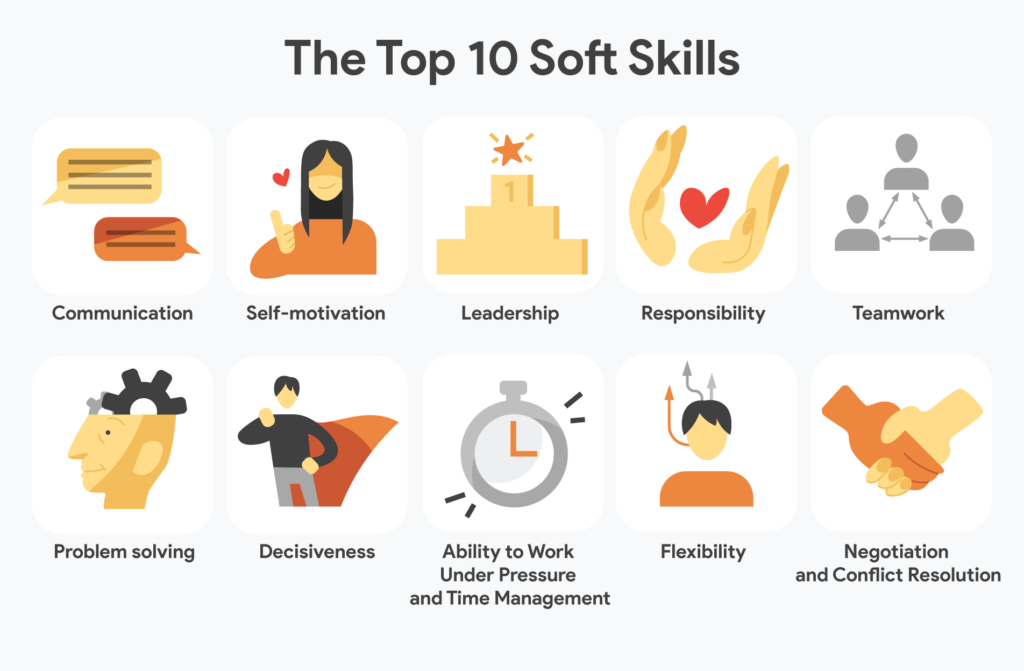
When companies post job openings, they’re looking for specific skills that will make you a top contender. To increase your chances of getting hired, it’s crucial to understand the skills required and how to showcase them in your resume. These skills can be categorized into two main types: hard skills and soft skills, often a combination of both. In this article, we’ll explore the definitions, examples, and differences between these skills, and provide guidance on how to effectively highlight them in your CV to land your ideal job.
What Is The Difference Between Hard Skills And Soft Skills?
Hard Skills
Hard skills and soft skills are two distinct types of skills that are essential for personal and professional development. Hard skills are technical skills that are acquired through formal education, training, or experience. They are typically measured by certifications, licenses, or degrees, and are often required for specific jobs or industries. Examples of hard skills include programming languages, software proficiency, data analysis and interpretation, and foreign languages.
Soft Skills
Soft skills, on the other hand, are interpersonal and personality traits that are developed through life experiences, social interactions, and personal growth. These skills are valuable in all industries and roles, and are often considered essential for success in the workplace. Examples of soft skills include communication and public speaking, teamwork and collaboration, time management and organization, leadership and problem-solving, and adaptability and emotional intelligence. Unlike hard skills, soft skills are not necessarily acquired through formal education, but rather through practice and experience.

What are examples of Hard Skills?
Technical Skills:
- Programming languages (e.g., Python, Java, JavaScript)
- Data analysis and interpretation (e.g., Excel, SQL, Tableau)
- Digital marketing tools (e.g., Google Analytics, AdWords, Facebook Ads)
- Foreign languages (e.g., Spanish, Mandarin, French)
- Web development frameworks (e.g., HTML/CSS, React, Angular)
Mathematical Skills:
- Calculus
- Statistics
- Algebra
- Geometry
- Financial modeling
Scientific Skills:
- Biology
- Chemistry
- Physics
- Environmental science
- Laboratory techniques
Creative Skills:
- Graphic design (e.g., Adobe Creative Suite)
- Video editing (e.g., Final Cut Pro, Adobe Premiere)
- Writing (e.g., journalism, copywriting)
- Photography
- UI/UX design

What are examples of Soft Skills?
Communication Skills:
- Public speaking
- Presentation skills
- Active listening
- Conflict resolution
- Negotiation
Interpersonal Skills:
- Teamwork
- Leadership
- Time management
- Emotional intelligence
- Empathy
Problem-Solving Skills:
- Critical thinking
- Analytical thinking
- Creative problem-solving
- Decision-making
- Troubleshooting
Adaptability Skills:
- Flexibility
- Adaptability
- Resilience
- Stress management
- Continuous learning
Leadership Skills:
- Strategic planning
- Project management
- Coaching and mentoring
- Change management
- Talent development
Industry-Specific Skills:
- Healthcare: medical coding, patient care
- Finance: accounting, financial analysis
- IT: network administration, cybersecurity
- Education: curriculum development, instructional design
- Hospitality: customer service, event planning

Here are 5 Reasons why Soft Skills are Important?
Employers are increasingly looking for individuals who possess a unique combination of skills that go beyond mere technical expertise. These skills, known as soft skills, are essential for effective communication, collaboration, and problem-solving. They enable individuals to work efficiently, build strong relationships, and drive results. Here are five reasons why soft skills are important.
1. Enhances Collaboration and Teamwork:
Soft skills like communication, active listening, and empathy enable individuals to build strong relationships with colleagues, clients, and customers. This leads to effective teamwork, increased productivity, and better project outcomes. When team members can communicate openly and respectfully, they can share ideas, address conflicts, and work towards a common goal.
2. Improves Adaptability and Resilience
Flexibility, adaptability, and resilience help individuals navigate changing environments, challenges, and priorities. This enables them to pivot when necessary, manage stress, and maintain a positive attitude in the face of adversity. By being open to new experiences and challenges, individuals can grow professionally and personally.
3. Boosts Productivity and Efficiency:
Time management, organization, and prioritization enable individuals to manage their workload efficiently. This includes setting goals, creating schedules, and minimizing distractions. By maximizing productivity, individuals can achieve more in less time, reduce stress, and enjoy a better work-life balance.
4. Develops Leadership and Influence:
Soft skills like leadership, coaching, and mentoring help individuals guide and inspire others. This includes setting a positive example, providing constructive feedback, and empowering team members to take ownership. By developing leadership skills, individuals can motivate others, drive results, and advance their careers.
5. Enhances Customer Satisfaction and Loyalty
Customer service, active listening, and conflict resolution enable individuals to provide exceptional customer experiences. This includes understanding customer needs, addressing concerns, and delivering personalized solutions. By building strong customer relationships, individuals can increase loyalty, drive repeat business, and promote positive word-of-mouth.
How to Develop Your Soft and Hard Skills
Fortunately, there are many ways to enhance your skills and increase your employability.
Developing Hard Skills:
- Online Courses: Websites like Coursera, Udemy, and edX offer a wide range of courses on various subjects.
- Workshops and Conferences: Attend industry-specific workshops and conferences to learn from experts.
- Certifications: Obtain certifications like CompTIA, Cisco, or Google Analytics to demonstrate expertise.
- Bootcamps: Join coding bootcamps or data science bootcamps for intensive training.
- Mentorship: Find a mentor who can guide you in developing specific hard skills.
Developing Soft Skills:
- Practice in Everyday Situations: Improve communication, teamwork, and leadership skills in daily interactions.
- Join Clubs or Volunteer Groups: Develop teamwork and leadership skills through extracurricular activities.
- Seek Feedback: Ask colleagues, managers, or friends for constructive feedback.
- Role-Playing: Practice conflict resolution, negotiation, and public speaking through role-playing.
- Mindfulness and Self-Awareness: Develop emotional intelligence through mindfulness practices.
Conclusion:
To stay competitive in 2024 and beyond, consider:
● Continuous Learning: Invest in your professional development by taking courses, attending workshops, or earning certifications.
● Networking: Building strong relationships with professionals in your field can open doors to new opportunities.
● Adapting to Change: Be open to learning new skills and embracing emerging technologies.
● Specializing: Focusing on a particular area of expertise can make you more valuable to employers.
By developing the right combination of technical, soft, and specialized skills, you can position yourself for success in the competitive job market of 2024.
For more Job opportunities and tips to successfully land your dream job, you can read through our previous blog post for more educative insight to get a job and you can as well upload your CV to our Job platform. Our platform harnesses the power of advanced artificial intelligence algorithms to meticulously match your qualifications, skills, and preferences with relevant job opportunities across various industries.